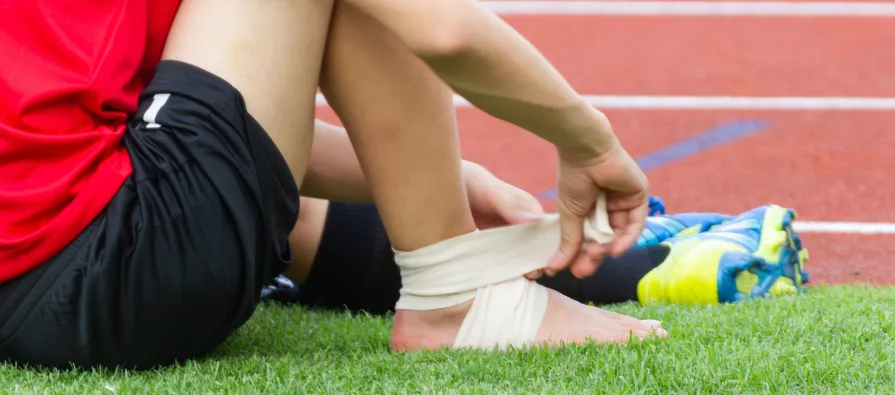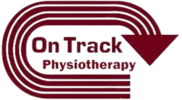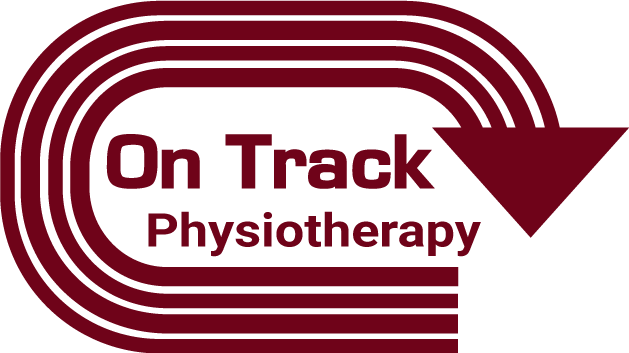On Track Physiotherapy
Athletes in Ann Arbor

Overcoming Sports Injuries in Ann Arbor
If you’re an athlete or active individual who has sustained an impactful sports-related injury, you understand the mental and physical challenges it can present. Beyond the initial pain and discomfort, a severe injury often sidelines your training, disrupts performance goals, and in some cases even threatens your overall health and activity levels long-term.
The good news? With proper physical rehabilitation tailored to your unique needs, the vast majority of sports injuries can be treated successfully without turning into chronic issues. At On Track Physiotherapy, our physical therapists have helped hundreds of athletes in the Ann Arbor area not only recover but also enhance their strength and agility to pursue their performance goals injury-free.
How Sports Injuries Occur in Ann Arbor
Sports injuries encompass any physical damage sustained during athletic activity or exercise. They can range from acute injuries like sprains, fractures, and tears requiring immediate attention to chronic overuse issues like tendonitis, bursitis, and stress fractures that develop over time.
Common causes of sports injuries include:
- Sudden impact – Especially in contact sports, colliding with another player or falling can lead to contusions, fractures, dislocations, and muscle/ligament tears
- Repetitive stress – Performing the same motion again and again during training, like an overhead serve in tennis or lots of kicking drills in soccer practice, can create microtears and inflammation
- Improper technique – Having suboptimal or flawed movement patterns when executing skills often overloads muscles/joints and leads to overuse issues over time
- Inadequate conditioning – Lacking flexibility, balance, core/postural strength, and muscular endurance makes athletes more injury-prone overall
Depending on the location, severity, and one’s biology, sports injuries can range from small disruptions to major setbacks impacting quality of life. Even beyond the physical implications, they often create mental/motivational challenges for driven athletes suddenly unable to train or compete at their normal level.
Why Proper Rehab and Care Matters
Many weekend warriors and amateur competitors attempt to push through injuries, rationalizing the discomfort as a temporary sacrifice on their path to fitness goals or competition success. But without structured treatment and rehabilitation, acute injuries become chronic liabilities and minor impacted areas turn into major weakened links that limit performance.
This mindset frequently backfires over time, causing people to plateau earlier, experience complications, undergo additional treatments like surgery, or quit their sport altogether from sheer frustration. It also significantly elevates their risk of re-injury by failing to address the underlying movement dysfunction, strength imbalances, and technical flaws that caused the issue in the first place. But when executed strategically, sports injury rehabilitation serves multiple vital purposes, including:
- Promoting Tissue Healing – Physical therapists design personalized treatment programs with targeted interventions to help damaged structures like muscles, joints, tendons, and ligaments heal optimally. This can drastically reduce recovery timelines and minimize long-term impairment.
- Restoring Strength and Mobility – Specialized strength training, stretching, and manual therapy techniques restore functionality, joint range of motion, and power output to pre-injury levels (or better).
- Preventing Re-Injury – By identifying and correcting biomechanical dysfunctions, strength/flexibility imbalances, and technical errors, future injuries can be minimized or avoided altogether.
- Enhancing Sports Performance – Not only recovering from injury but taking your athleticism to new heights is possible through advanced rehabilitation strategies tailored to your sport.
- Facilitating Lasting Lifestyle Changes – Improving understanding of injury mechanisms plus self-management empowers athletes to make smarter training decisions and keep their bodies feeling great long-term.
On Track Physiotherapy’s Comprehensive Sports Injury Rehabilitation Approach
At On Track Physiotherapy, your entire care team will collaborate closely with you to overcome your injury for good and achieve your athletic goals injury-free. With our optimized blend of hands-on interventions, personalized exercise prescription, preventative care, and patient education, you’ll receive comprehensive treatment setting you up for sustainable success.
We’ve refined an effective methodology for sports injury rehabilitation including:
Stage 1 – Early Intervention For Optimal Healing
In the early aftermath of an injury, our main priority is promoting tissue healing and rapidly reducing pain/inflammation to prevent further damage and degeneration. This starts with a thorough evaluation identifying all impacted structures. We then craft a customized treatment plan including:
- Pain-relieving modalities like heat/ice, electrical stimulation, ultrasound, and manual therapy
- Gentle joint mobility and tissue extensibility exercises
- Progressively challenging strength training avoiding overtaxing injured areas
- Consideration of bracing, taping, ambulatory aids like crutches to offload injured limbs
- Referral coordination with doctors for imaging tests, medication, injections, or surgery if necessary
The goal is resolving acute symptoms, maximizing your comfort, maintaining strength/ROM wherever possible, and following all medical recommendations for optimal recovery.
Stage 2 – Regaining Full Mobility and Strength
As injured tissues heal and pain/swelling subside, we advance rehabilitation by systematically restoring flexibility, joint mobility, balance, strength, and neuromuscular control toward pre-injury levels. Customized programs help you rebuild foundational movement patterns and sport-specific skills in a controlled, progressive manner. We also begin scar tissue mobilization and functional re-education.
Stage 3 – Corrective Exercise for Injury Prevention
Once cleared for full activity, we perform comprehensive movement assessments identifying biomechanical dysfunctions and imbalances that may elevate injury risk – like poor pelvic/core stability, quad dominance, overpronation, or muscular tightness. After pinpointing problem areas, we implement prescriptive corrective exercises tailored to your needs – integrated into warm-ups/cool-downs plus standalone routines. This proactive prevention significantly reduces the odds of issues reemerging.
Stage 4 – Advanced Performance Enhancement
If desired, we can take your athleticism to new heights once fully rehabilitated by upgrading power, quickness, agility, coordination, and stamina with advanced techniques like:
- Physical literacy training and movement pattern mastery
- Targeted plyometric and medicine ball routines
- Sport-specific agility drills and decision-making skills
- Periodized conditioning tailored to your goals
- Fine-tuning techniques and correcting limiting factors
We’ll also optimize nutrition and recovery strategies so you consistently perform at your best during competition and avoid setbacks. Throughout the process, patient education regarding tissue healing timelines, smart training progressions, warning signs to avoid, and independent self-care is paramount so you remain actively engaged.
Treating Ann Arbor’s Most Common Sports Injuries
With our diversified medical background and continuing education focused on sports rehab, On Track Physiotherapy confidently treats athletes across all disciplines suffering from various orthopedic and neuromuscular impairments.
Some of the most frequent sports injuries plaguing Ann Arbor athletes that we help clients overcome include:
Knee Injuries
- ACL tears
- Meniscus tears
- Patellar tendonitis (jumper’s knee)
- MCL/LCL sprains
- Chondromalacia patella (runner’s knee)
- Baker’s cysts
Shoulder Injuries
- Dislocations
- Labral tears
- Rotator cuff strain
- Impingement
- Glenohumeral instability
Ankle Injuries
- Sprains
- Fractures
- Achilles tendonitis
- Peroneal tendonitis
Lower Back Pain
- Intervertebral disc injuries
- Segmental instability
- Spondylolisthesis
- Sciatic nerve impingement
And many additional conditions – ask us if you don’t see your specific concern listed!
Frequently Asked Questions About Sports Injury Rehab
If you’re dealing with a sports injury and considering treatment, some common questions we hear include:
What are the 5 most common injuries in sports?
According to epidemiological research, the most frequently occurring sports injuries across all levels of competition are:
- Sprains and strains – Impact knee/ankle ligaments and attach tendons/muscles
- Stress fractures – Overuse repeatedly overloading bone tissue
- Runner’s knee – Kneecap tendon inflammation causing anterior knee pain
- Tennis elbow – Outside elbow tendon degeneration with repetitive backhand strokes
- Low back pain – Intervertebral disc injuries or muscle strains from rotational force
What exactly constitutes a sports injury?
Any physical damage sustained to musculoskeletal structures like ligaments, muscles, joints, tendons, nerves, or bones qualifies as “sports injuries”. They occur specifically due to athletic activity versus everyday wear-and-tear or accidental trauma. Sometimes singular, dramatic impact incidents cause them. But more often gradual, repetitive microtrauma during training/competition builds up over time eventually causing more noticeable, symptomatic injuries.
What are considered the 3 worst sports injuries?
Ranking sports injuries prove challenging due to subjectivity, but 3 hugely impactful ones include:
- ACL knee tears – Frequently non-contact and ending athletic seasons or careers
- Achilles tendon ruptures – Very limited blood flow makes complete recovery tough
- Concussions – Brain trauma with poorly understood long-term effects
What is the #1 most common injury in sports overall?
The most prevalent sports injury across the general population is lateral ankle sprains – impacting approximately 2 million athletes annually in the U.S. alone per research data. Sudden excessive inversion force damages the ATFL ligament on the outside ankle. Proper rehabilitation reducing swelling and then restoring balance/proprioception is vital for preventing recurrence.
Please reach out with any additional questions – our passion lies in helping Ann Arbor athletes like yourself overcome injuries and achieve your goals!
Meet Your On Track Physiotherapy Sports Medicine Team
Your customized treatment plan will be overseen by our experienced clinical team including physical therapists Dr. Greg Schaible, DPT, CSCS, and Dr. Morgan Kennedy, DPT, TPI, FDN, CIMT, CAFS. With specialty training plus a combined 15+ years working with patients, they are uniquely equipped to manage your injury recovery at every step and upgrade sports performance long-term.
We also coordinate care closely with top Ann Arbor orthopedists, sports medicine physicians, athletic trainers, massage therapists, and sports psychologists to deliver fully integrated, results-driven rehabilitation for amateur competitors to pros getting back in the game after injury.
Start Your Injury Recovery at On Track Physiotherapy
If you’re currently sidelined from your favorite sport due to injury – or attempting to perform through pain and mobility limitations – take the first step toward relief and better long-term outcomes by scheduling an exam with a On Track Physiotherapy physical therapist.
Call 734-972-6529 or book easily online to claim your initial assessment. This appointment will include:
- Comprehensive injury history intake and thorough testing
- Establishing precise diagnosis, severity grading plus treatment timeline estimates and expectations
- Customized recovery plan development addressing all relevant impairments
- Getting started with pain-modulating treatments and gentle exercises/manual therapy as appropriate
- Answering all initial questions regarding rehabilitation specifics, prevention, and athletic goals
Don’t wait and risk prolonged symptoms or recurring issues down the road. Get back on track to perform at 100% by working with one of Ann Arbor’s top outpatient sports medicine physical therapy clinics starting today!
About The Author
Conquering sports injuries with personalized care is Dr. Greg Schaible’s passion. This licensed Physical Therapist specializes in Certified Strength & Conditioning and Sports Rehab, drawing upon years of experience to help individuals overcome sports injuries and their challenges. At On Track Physiotherapy in Ann Arbor, Dr. Greg Schaible employs a patient-centered approach, wielding cutting-edge techniques and bespoke care plans to empower individuals to reclaim their physical well-being.


